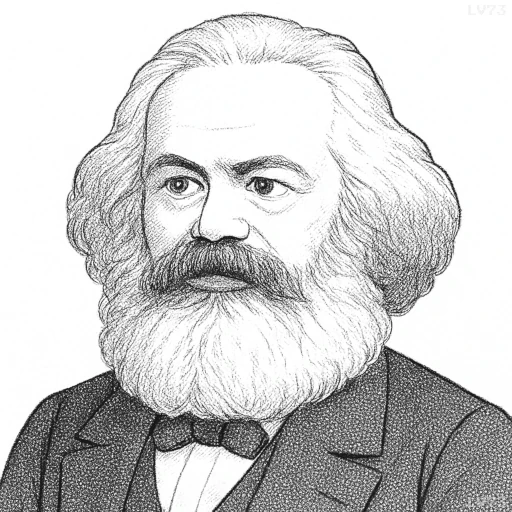“History repeats itself, first as tragedy, second as farce.”

- May 5, 1818 – March 14, 1883
- Born in the Kingdom of Prussia (Germany)
- Philosopher, economist, political thinker
table of contents
Quote
“History repeats itself, first as tragedy, second as farce.”
Explanation
In this quote, Marx reflects on how historical events or social movements can repeat, but with a shift in tone or meaning over time. The first repetition of history is experienced as tragedy, where the events are deeply dramatic and often filled with real suffering, loss, or a serious conflict. This refers to the initial struggles of oppressed classes or revolutions that may have had significant and tragic consequences, such as the French Revolution or the rise of the working class in Marx’s time. The second time history repeats itself, however, it does so as farce—a mockery or imitation of the original tragedy. In this phase, the serious nature of the event is replaced by a sense of absurdity, comedy, or irony, often when the lesson of the past is forgotten, distorted, or repeated in a way that lacks the original intensity or purpose.
Historically, this quote can be interpreted as a commentary on the cycle of revolutions and political upheavals. Marx saw the rise of revolutionary movements as necessary steps toward social change, but he also recognized that when the original goals of these movements were co-opted or misinterpreted, the results could become a mockery of their original ideals. For example, after the French Revolution, which began as a fight for liberty and equality, the subsequent Napoleonic Empire could be seen as a farcical repetition of the original tragedy, where the revolution’s ideals were replaced by the autocratic rule of Napoleon. In the Russian Revolution, Marx might have seen the rise of the Stalinist regime as a second repetition of the revolutionary impulse, but one that devolved into a totalitarian state, contradicting the ideals of equality and freedom that it initially promised.
In modern terms, this quote can be seen in the context of revolutionary movements or social changes that fail to live up to their ideals or lose their original purpose over time. For instance, political movements that initially promise social justice or liberation can sometimes end up in corruption, bureaucracy, or authoritarianism, leading to a repetition of past mistakes. Marx’s quote also speaks to the absurdity of political situations where history’s lessons are ignored or distorted, such as when political ideologies become disconnected from the material conditions that originally inspired them. The repetition of history as farce can be seen when revolutionary ideals become commodified, institutionalized, or corrupted in ways that mock the original intentions, turning serious movements for change into performative actions or hollow gestures.
Would you like to share your impressions or related stories about this quote in the comments section?

